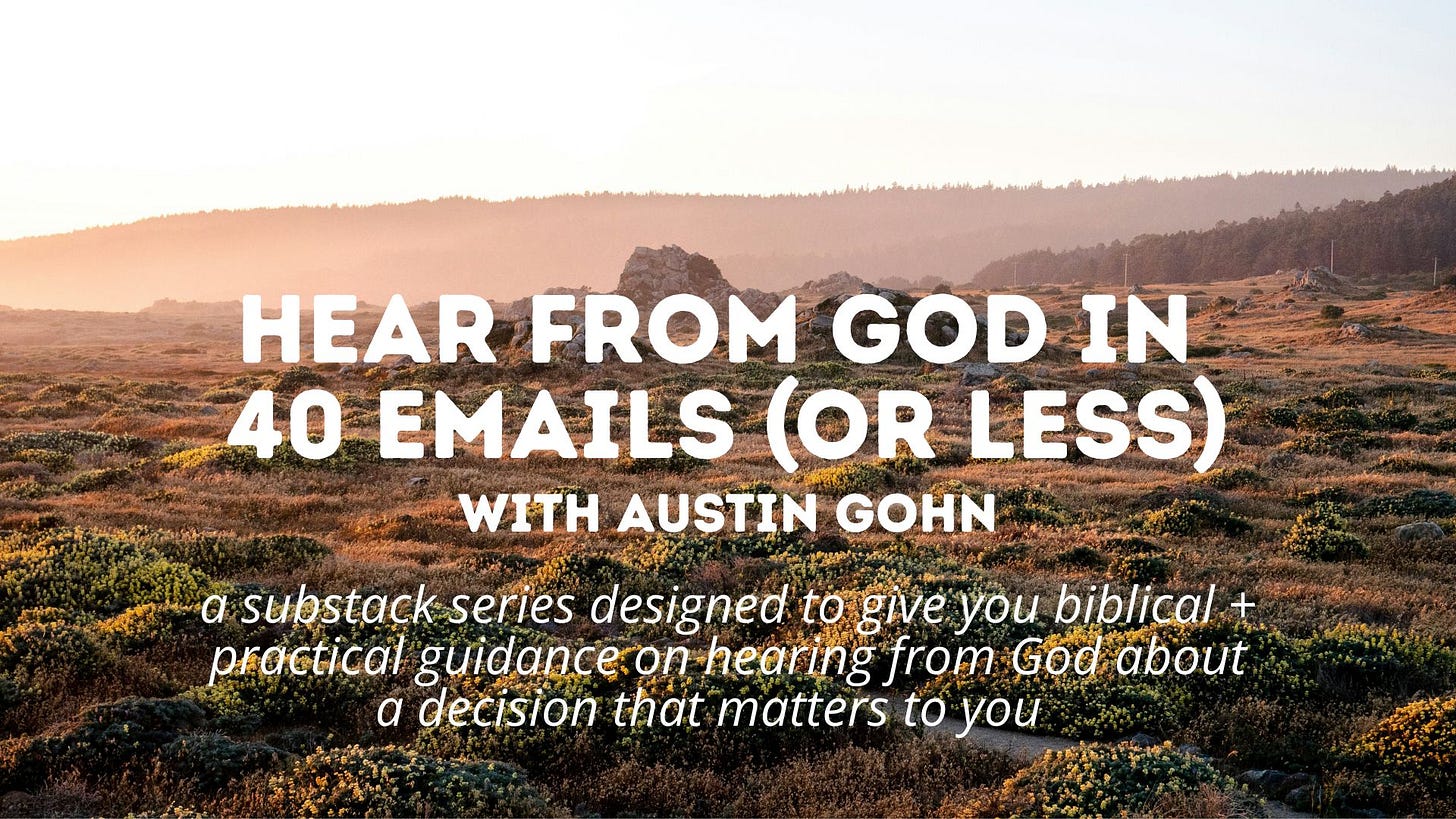Is God Like the Sorting Hat in Harry Potter?
Ruth Haley Barton’s “Prayer of Indifference” and whether or not God takes your preferences into account.
As part of Hear from God in 40 Emails (or Less), we’re exploring the five steps that will prime you to hear from God: 1) Clarify the Question, 2) Set a Deadline, 3) Name Your Options, 4) Pray for Indifference, and 5) Ask for Guidance.
In Harry Potter and the Sorcerer's Stone, there’s a scene when all the first-year students show up at Hogwarts School for Witchcraft and Wizardry and a magical “Sorting Hat” separates each of them into one of four different houses: Slytherin, Hufflepuff, Gryffindor, and Ravenclaw.
Harry is afraid that he’ll be selected for Slytherin—one of the more notorious houses at Hogwarts. He discovers, though, that the Sorting Hat hears his thoughts and sends him to Gryffindor instead, changing his destiny.
Years in the future, when his own son is about to go to Hogwarts (and is also worried that he’ll be sorted into the Slytherin house), Harry says to him, “The Sorting Hat takes your choice into account.” In other words, the Sorting Hat doesn’t always do exactly what new students want, but it at least desires to hear what they want—and, sometimes, it changes course.
Here’s the question: Is that how God works?
In some cases, maybe. In other cases, definitely not. And, being prepared ahead of time for either possibility is what the rest of this email is all about.
After you name your options, whether you’re Harry and they’re the four houses of Hogwarts or you’re me at the end of the college and it’s options like Japan or New Hampshire, you’re almost primed to ask God for his guidance. But, there’s one more critical step you need to take.
It’s a step that even Jesus took.
“Not My Will, But Yours Be Done”
After his final meal with his followers, Jesus went to a place called the Garden of Gethsemane to pray. In one account of the scene, it says, “Then he withdrew from them about a stone’s throw, knelt down, and began to pray, ‘Father, if you are willing, take this cup away from me—nevertheless, not my will, but yours, be done’” (Luke 22:41-42).
As the rest of the gospel account shows, Jesus is well aware that he’s going to suffer and die when he reaches Jerusalem. That’s “the cup” he’s talking about here.
Yet, knowing this, Jesus shares his preference to God in prayer, saying something like, “Father, if it’s possible, give me anything but that.” It’s like Jesus is saying: If there’s a couple of different options for how your will can be accomplished in my life, can I have one that’s not a cross? Maybe, there are some other cups out there. Any of those would be preferable, and he’s not afraid to admit it.
But, that's not where Jesus ends his prayer in the garden. “Nevertheless,” he prays through anguish, “not my will, but yours, be done.” Even if I might prefer a different “cup,” he says, I’ll drink the cup you want me to drink.
Shortly, after this prayer, he’s arrested—and, rather than resisting, he goes willingly. Why? He was primed to do what God wanted.
The Prayer of Indifference
Ruth Haley Barton, an author and spiritual director, who has spent multiple decades guiding people to listen for God in major decisions, describes what Jesus does in the Garden of Gethsemane as the “prayer of indifference.”1
The prayer of indifference is basically saying to God, “Lord, I’m indifferent to anything other than your will for me in this decision.” To be indifferent is to get to the point where you are truly open to whatever it is that God wants for you.
Growing up, I often heard the opposite of the prayer of indifference, especially at Christian summer camp. It seems like every few years, inevitably, there would be a moment when the camp speaker would preach on Isaiah’s famous line, “Here I am, send me.” And, we would all, like Isaiah, be encouraged to pray that same prayer. But, as we did so, we’d often add a few qualifiers. “Here I am, send me—anywhere but _________,” we’d pray.
And, as I was preparing to graduate from college, I was praying, “God, send me anywhere—but Pittsburgh.” I was an intercultural studies major, and I wanted to go anywhere in the world, except where I grew up.
That’s not the prayer of indifference.
Often, as Ruth Haley Barton points out, it’s a struggle to get to the point where you can really say that you’re indifferent to anything but God’s will. It’s one thing to say it, it’s another thing to mean it. She says you have to say the prayer for indifference before you’re ready to say the prayer of indifference. You might need to say to God, “I’ll be honest. I’m not at all indifferent to these options, and I need your Holy Spirit to help me surrender.”
But, once you get to the point of “holy indifference,” you’ll find that it’s much easier to hear what God might want to say to you.
George Muller, in his own guidance on “How to Ascertain the Will of God,” says, “Ninetenths of the difficulties are overcome when our hearts are ready to do the Lord's will, whatever it may be. When one is truly in this state, it is usually but a little way to the knowledge of what His will is.”2
Before the Prayer of Indifference
In order to pray the prayer of indifference, there’s two basic steps you can take after naming your options:
Admit your preference. Be honest with yourself and God about what you want or what you definitely don’t want. It’s okay to have a preference, it’s just not okay to let your preference be the deciding factor. He already knows your preference anyway, and it's an opportunity for you to say it out loud.
Ask for indifference. As you do this, ask yourself why you prefer one option over the other: What’s keeping you from being indifferent? Does it sound easier? Does it sound more fun? Does it feel less costly? When you ask questions like these, you’ll get to the heart of your preferences. Then, invite the Holy Spirit to help you move toward a state of “holy indifference”—like Ruth Haley Barton writes about.
In the end, even after you say a prayer of indifference, you might sometimes find that God himself is indifferent to which option you choose—especially when the decision involves multiple morally neutral or good options. He might say to you, “Those are all good options, which one are you leaning toward?”
In fact, what Harry Potter says to his son about how the Sorting Hat works sounds an awful lot like what the writer of Psalm 37:4 said, “Take delight in the Lord, and he will give you your heart’s desires.”
In the end, God might give you the desires of your heart, especially when they are aligned with his own, but the prayer of indifference leaves open the possibility that he might not (especially if one of the choices is sinful)—and that’s okay.
Sometimes, God takes your choice into account, and, sometimes, whether you like it or not, he says, “This is what I’ve chosen for you” because God is more than just a cosmic Sorting Hat (which, at its worst, sounds a lot like a lot like the Cool God we’ve already explored).
This is email 14 out of 40 in Hear From God in 40 Emails (Or Less). Start with the first email.
Ruth Haley Barton, Pursuing God’s Will Together, 188-190.








I loved this, especially the part where it says to 'pray for indifference' - we may think we are indifferent, but when we sit and think about it, are we really?